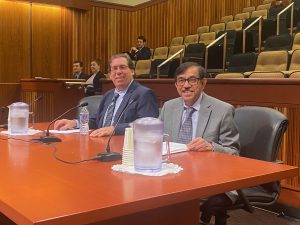
November 7, 2023 — PEF Executive Board members Christopher Ford and Prakash Lal testified on the impact of artificial intelligence (AI) on the state workforce before the State Assembly’s Standing Committees on Labor and Science & Technology on October 19. Both are longtime PEF members at the Office of Information Technology Services (ITS).
“AI has and will affect everyone’s lives and livelihood and has and will continue to have a profound impact on our members and the services they provide to the State of New York,” said Ford. “As the use of AI expands exponentially across all platforms, there are no regulations or unified protocols or practices for entities that develop, distribute or use these systems.
“In our written testimony, you will find recommendations that our union has developed to ensure that the continued development of and deployment of AI is responsible and ethical by developers and users—including the State,” Ford said.
AI works based on the information given to it, which informs how it processes that information and what information is given back to a user. Accordingly, PEF recommends complete transparency when it comes to the data AI uses to power its algorithms. PEF also recommends that the testing and oversight of AI be ongoing, especially to protect data privacy, security, and copyright.
PEF reminded lawmakers that the explosive growth of AI will have real-world impacts.
“The continued development of AI will have a major impact on workers as both public and private sector employers are using AI systems to perform tasks that were once performed by actual people,” said Lal. “We need to protect workers from losing their jobs to AI systems. We need to ensure that workers impacted by the development of AI have access to upskill or reskill training for other positions. AI should inform and assist in service delivery, not displace them.”
Some of the assembly members asked Ford and Lal what exactly that training might look like and what, if anything, New York is already doing.
“At present, New York State doesn’t have an AI inventory,” Lal said. “We do not know where AI is being used in the state, so we do not know of training being provided at the moment.”
“Additionally, we should never substitute humans with AI systems around eligibility for public assistance, mental health referrals, substance abuse treatment, or any other human service need,” Lal said. “What we cannot afford, after a decade of hiring freezes and job cuts, is anything that would further erode the State’s safety net services.”
AI’s Role in the Workplace
Ford and Lal both stressed that while AI is not new, especially at ITS, it is rapidly changing how workers do their jobs, how those who use state services interact with the state, and how employers hire and attract workers.
“We’ve always had search engines, we’ve always had surveillance in the workplace, we’ve always had time keeping systems,” Ford said. “The application of AI allows for faster decision making based on that data, it does not necessarily allow for more accurate or ethical use of that data in making those decisions.”
Ford, and the members he represents, are mostly seeing AI augment their work, instead of replacing workers outright, but that doesn’t mean it isn’t happening elsewhere or that members in his unit couldn’t be replaced in the future.
“I would say that much of the workforce over time would face the need for reskilling or upskilling,” Ford said. “I would also say that newer members entering the workforce, you hear all the time that they like to change what they do, jump jobs, try new things. I have hope that they will adapt quicker than those of us who are already in the workforce.”
Ford and Lal offered examples of how AI has helped the State workforce, with call centers implementing chatbots to help with queues and handling concerns in an orderly fashion. Their concern lies with decision making. AI should not be relied upon to make determinations regarding public goods and services.
“Where I see great risk is with the service providers,” Ford said. “Things like Department of Labor unemployment insurance decisions, social work, making decisions for parolees.”
The 2023-2026 PS&T contract includes a side letter establishing a joint committee with the state to continue discussions about AI in the workplace. PEF also recommended in its written testimony that New York establish a task force to determine how the state uses automated decision systems (ADS) or algorithms.
To read PEF’s full submitted written testimony, click here. To watch the testimony delivered by Ford and Lal, click here.

